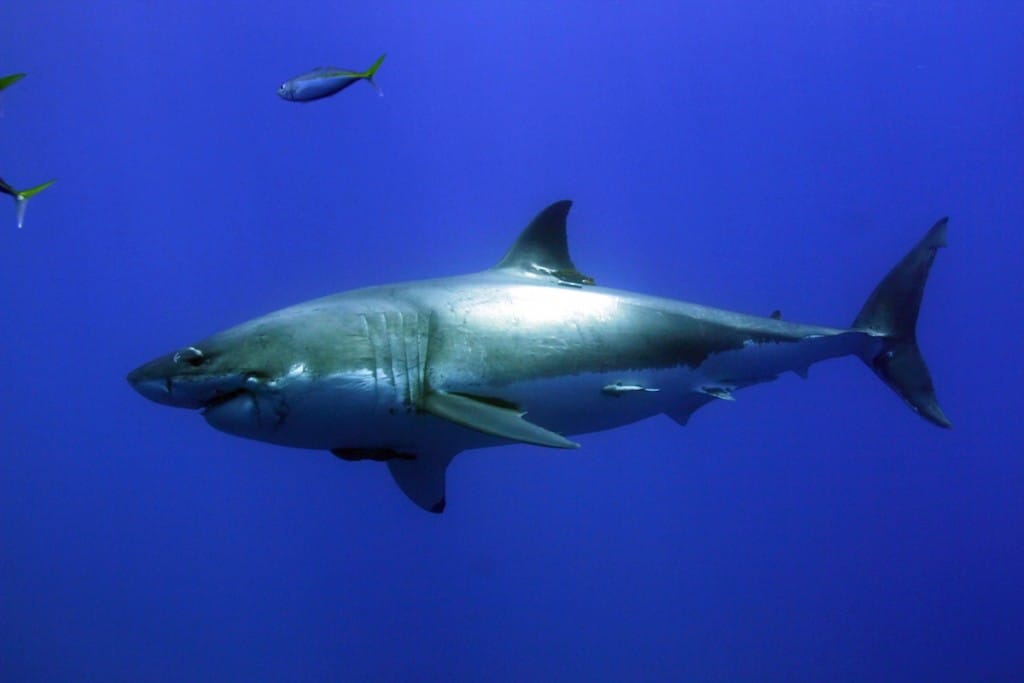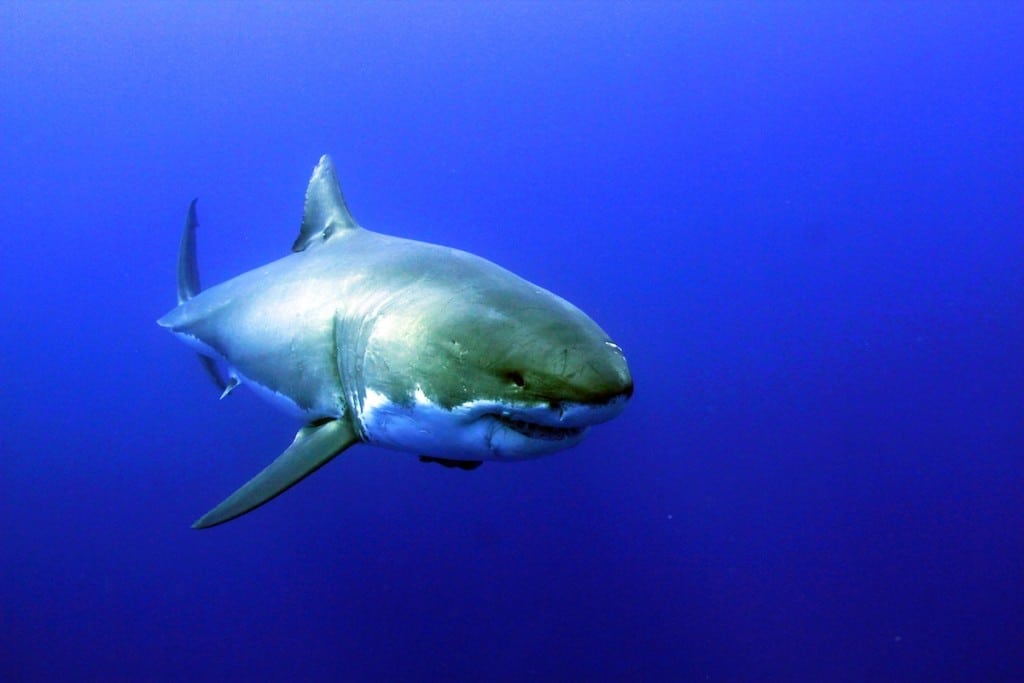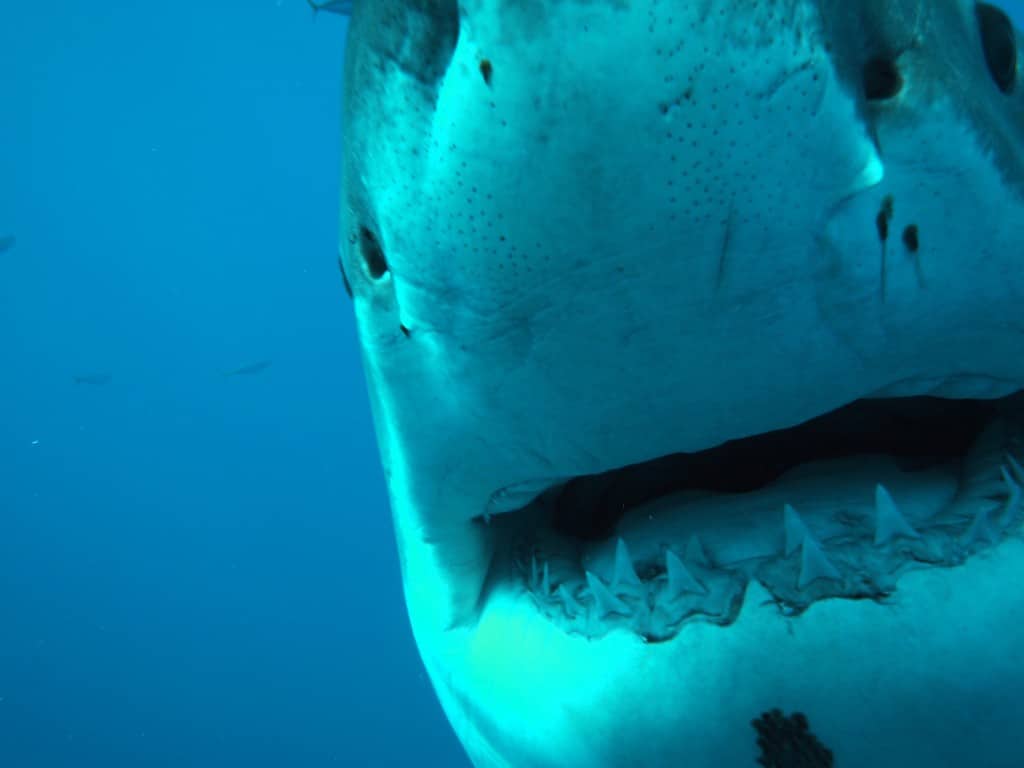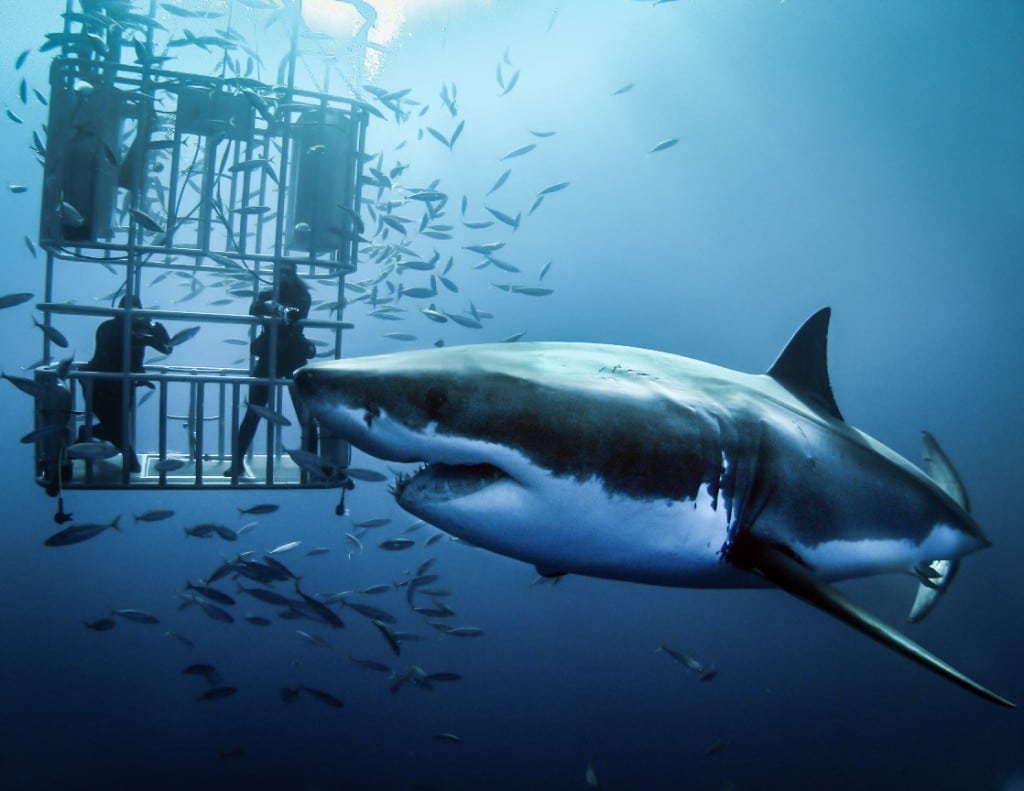Marine Life & Conservation Blogs
Caught by the Spell of a Myth

“The Great White Shark jangles our nerves
With a reputation he hardly deserves
Neither malice nor spite
Will cause him to bite
It’s not his fault we look like hors d’oeuvres.”
R. Aiden Martin
57 years ago, the publisher of the US magazine “LIFE” warned its readers in the cover story “Look out for sharks” of the danger of shark attacks. The total number would not be terrible (because very low) but of the cruel attack itself, he said:
“During 1959, sharks made 11 authenticated attacks on human beings in U.S. waters. Three of them were fatal. The number is not enormous, but the victims died deaths of horror – dismembered bite by bite as their executioners struck and turned, struck and turned again.” LIFE Magazine 11. July 1960

15 years later, a movie managed to spread real fear and terror. From now on, the sea was no longer seen only as a place for leisure and water sports but as a place where evil resides. This movie was “Jaws”. What many viewers did not know at the time was that the film resembles true events. In 1916, a shark on the New Jersey coast attacked five swimmers within twelve days – a man-eater! Even the words “man-eater” are deeply troubling…
This term makes millennia of human development null and void and takes us back to our beginnings as pitiful hominids roaming the African steppe, the region where the cradle of humanity stood. They crouched in fire-less caves, always on guard, always in fear that death lurked in the tall grass – or in the water. The idea of being eaten alive violates the dignity of man, undermining the sacred belief that we are ‘something better’ or ‘the crown of creation,’ as we like to call ourselves.
The shark tells us with his actions: “I do not care if you’re President of the United States, the Queen of England or just the average Joe, for me you’re not a ‘coronation’, you are the same as a seal or a dolphin – a protein supplier. Honestly, I prefer to chase you, because you are weak and slow.”
Sharks and crocodiles attack people. Amongst the big cats, leopards are even more feared human hunters than lions and as the peasants of India and Indonesia know, human flesh is also on the tiger’s menu. Although sharks rarely ‘eat’ people, they are considered to be monsters par excellence – perhaps because the shark is so deeply rooted in collective popular beliefs as no other predator. It is the center of a tradition that goes back to a time long before man began writing down the myths and legends that circulated around the campfire of fishermen.
In this sense, the book “Jaws” by Peter Benchley may be considered a saga in which myth and reality merge. The book recollects actual occurrences (albeit greatly exaggerated) but reads like an adventure novel. Action and topic make up his success. It does not only give you shivers down your spine, like a good horror story about occultism, it goes far deeper.

The film by Steven Spielberg is even worse. Relentlessly, he lets him strike again on the American East Coast. He does not just pick up on the historical events of 1916. He depicts the animal with a lot of aggressiveness, strength and human intelligence. A monster. He penetrates into the subconscious and gets stuck there – because you know that the story is somehow based on facts and not the abstruse fantasies of a fanciful Hollywood director.
This shark really lived (although it is doubtful if only one shark was responsible for all of the attacks). His victims were real, normal people. One suffers a kind of metaphysical shock.
Are we actually the crown of creation when a fish – a fish! – turns us so fast and easy into simple prey? The idea of being dead doesn’t scare us modern people. But the process and way of dying terrifies us. But one should not ask such a question – and certainly not answer it. Sharks do not submit to humans – and they do not recognize our alleged superiority. And so, it is hard for us to imagine that we, too, can be part of the food chain (and not at the very top) because we no longer feel as a part of nature.
In our over-mapped, overpopulated, over-explored world, it’s not often that an animal gives up such mystery. But we do not need to know everything. Some things are in good hands in the fog of secrets and mystery. I am glad that there are still unresolved questions, because after all they are the ones who stimulate the imagination. Sharks are beautiful in a scary way and the epitome of all the unknowns that still exist apart from our civilization.

In a time when human mastery of our terrestrial realm grants us the illusion that we can control everything from atoms and genes, to the destiny of our planet, it is humbling that something as simple as a big fish can put us back in our place.
In a 1987 interview with Time magazine, “Far Side” cartoonist Gary Larson put our situation into irreverent and incisive perspective: “I think it’s wonderful that we live in a world in which there are things that can eat us. It keeps us from getting too cocky.”
Food for thought?
Blogs
Saba’s Plan for a Coral Comeback

Saba has an exciting new initiative to restore its coral reefs. This new project, running from 2024 to 2026, will focus on reviving key species in the island’s underwater ecosystems. With a collaborative team from the Saba Conservation Foundation (SCF) and Van Hall Larenstein (VHL) University of Applied Sciences, the project aims to restore both corals as well as sea urchins.
This initiative is centered around coral restoration, specifically reviving two essential coral species—staghorn coral (Acropora cervicornis) and elkhorn coral (Acropora palmata). By mapping parent colonies and using a technique known as coral gardening, SCF will create and maintain coral nurseries. These corals will eventually be outplanted at key reef sites around Saba to not only expand the number of coral colonies, but also provide essential fish habitat. The project focusses on installing coral nurseries, training staff with the newest techniques and starting with the restoration of key reef sites.

Reef Cleaners to the Rescue
It’s not just corals getting a makeover—this project also shines a spotlight on the essential role of grazers, particularly sea urchins. VHL is leading the charge on cultivating and restocking two key sea urchin species, West Indian sea egg (Tripneustes) and long-spined sea urchin (Diadema), known for their ability to keep algae in check. By removing algae, which are important competitors of corals, they help the coral to thrive. By restoring these “reef cleaners,” Saba’s project will give corals the breathing room they need to grow, setting the stage for a healthier, more balanced marine ecosystem.
From Tiny Urchins to Big Goals
The project will be funded as part of the Dutch Government’s Nature and Environment Policy Plan (NEPP) 2020-2030 for the Caribbean Netherlands, a comprehensive initiative aimed at conserving and restoring the unique natural environments of the Dutch Caribbean islands, including Saba, St. Eustatius, and Bonaire. This project is aiming for big milestones: build and maintaining coral nurseries, the expansion of urchin cultivation facilities, and the creation of a dedicated research center. By 2026, the project hopes to ramp up coral and grazer restoration, with the ultimate goal of extending these efforts across the Dutch Caribbean. By linking local initiatives to broader regional goals, Saba’s restoration project promises to leave a lasting impact on both the environment and the community.
Find out more about the DCNA at dcnanature.org.
Blogs
Reef-World marks two decades of marine conservation: strengthening impact amid coral reef threats

Empowering ocean stakeholders to tackle future challenges and ensure the survival of coral reefs and humanity
2024 marks the 20th Anniversary of The Reef-World Foundation’s tireless efforts for global coral reef conservation. The UK charity is the international coordinator of the UN Environment Programme’s Green Fins initiative, known as the leading voice in sustainable marine tourism. Today, Reef-World released its 2023-2024 Impact Report outlining a year of substantive growth and impact in its marine conservation programmes.

Impact Report Highlights:
- Impressive improvements in environmental behaviours to protect coral reefs by the marine tourism industry as the global participation of Green Fins increases.
- Continued capacity building for government and NGO staff to effectively manage marine tourism activities in Asia, Caribbean and Red Sea regions.
- For the first time in Green Fins’ 20-year history, tourism operators have achieved ‘Best Environmental Performer’ status by demonstrating the lowest possible environmental impact in their environmental assessments. In 2024, three dive operators achieved this challenging milestone.
- Significant increases in global participation of Reef-World’s innovative digital conservation tools.
- 138 Green Fins dive operator members achieved the strict threshold for PADI Eco Center recognition.
- Developed four new educational materials and translated two into 16 languages to support the marine tourism industry in achieving sustainability targets.
- Establishing a new Reef-World Development strategy and recruiting new roles – Development and Programmes Managers.
- Reef-World’s board welcomes new Chair and Trustees strengthening organisational leadership.

Reef-World started as a one-person mission to inspire and empower communities to act in conserving and sustainably developing coral reefs and related ecosystems. Today, the team of 12 continues to meet this mission by inspiring and empowering the global marine tourism community to be exemplary sustainability leaders by using the Green Fins guidelines and tools to simultaneously use and protect the world’s precious reefs.
In April 2024, the fourth global coral reef bleaching event was confirmed. Reef-World’s work has never been more urgent as the marine environment, and the benefits they provide humanity, continue to be eroded by global threats. The reduction of local threats, like those from the marine tourism industry, is an essential step to ensuring a future where coral reefs survive and continue to support the millions of people who depend on their ecosystem benefits. Reef-World’s work buys time for coral reefs and related ecosystems to be resilient to the impacts of global threats.
“Right now our corals are facing the greatest fight of their existence as the terrifying predictions of the steps towards their complete extinction are starting to come true. But all is not lost, reefs are resilient and they have existed on this planet for millions of years. We must take action now, to buy time for reefs by reducing threats facing them and allowing them to react and adjust to the changing environment they need to survive in.” – Chloe Harvey, Executive Director
Looking Forwards:
Like coral reefs, the Reef-World team needs to be resilient in the face of the complex challenges of the conservation sector. Reef-World has invested significantly in developing a Culture of Care to ensure the well-being of its team on a daily basis, continuing to be an exemplary employer to enable its team to best achieve the mission for coral reef conservation.
With the foundations of a Culture of Care and organisational development laid, Reef-World is emerging from the end of a natural organisation life cycle, that brings the challenges of growth and scale, stronger than ever. With a new strategy in place to generate much needed resources, Reef-World is excited for the opportunities to leap forward, continue to scale our impact and lean into new innovations and untapped opportunities for marine conservation.
We continually strive to become a forward-thinking organisation that delivers on our goals and commitments to our stakeholders with fresh approaches and not being afraid of steering away from a “normal approach.” This approach is not only applied to our programmes of work but also internally and carries over to our Culture of Care for our team.” — JJ Harvey, Operations Director

The Reef-World Foundation is immensely grateful for the continued support of its grant funders: UN Environment Programme, IUCN’s Blue Natural Capital Financing Facility, Adventure Travel Conservation Fund, PADI Aware Foundation, and World Nomads Footprints Program.
Reef-World would also like to express its gratitude to international partners whose vital support has resulted in significant tangible benefits for our work and mission: PADI; Professional SCUBA Schools International (PSS); Explorer Ventures; 1% for the Planet; ZuBlu; Snorkel Venture, GSTC; Dive O’Clock; Seven Dragons; DiveAssure and Eco Beach, without whom these achievements would not be possible.
The full 2023–2024 Annual Impact Report is available on Reef-World’s website.
-

 News2 months ago
News2 months agoIconic SS United States to become the World’s Largest Artificial Reef
-

 News3 months ago
News3 months agoBook Review – 52 Assignments: Underwater Photography
-

 Gear News3 months ago
Gear News3 months agoDYNAMICNORD – New German diving brand enters the British market
-

 News3 months ago
News3 months agoExploring Cenote El Pit: A Diver’s Dream
-

 Gear News3 months ago
Gear News3 months agoTry BARE drysuits (and maybe even win one!) this Friday with Sea & Sea at North West Dive Fest
-

 Marine Life & Conservation3 months ago
Marine Life & Conservation3 months agoBook Review: Coral Triangle Cameos
-

 Blogs2 months ago
Blogs2 months agoDive the Egyptian Red Sea this Autumn with Regaldive
-

 News3 months ago
News3 months ago2024 Ocean Art Underwater Photo Competition Announced















